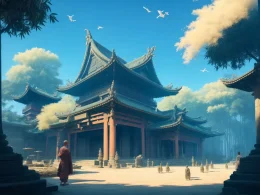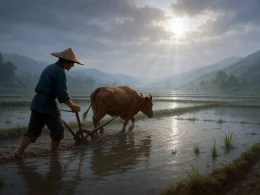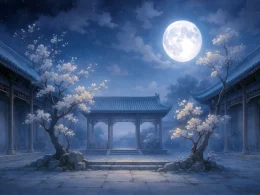High beyond the thick wall a tower shines with sunset
Where peach and plum are blooming and the willowcotton flies.
You have heard in your office the court-bell of twilight;
Birds find perches, officials head for home.
Your morning-jade will tinkle as you thread the golden palace;
You will bring the word of Heaven from the closing gates at night.
And I should serve there with you; but being full of years,
I have taken off official robes and am resting from my troubles.
Original Poem
「赠郭给事」
王维
洞门高阁霭余辉,桃李阴阴柳絮飞。
禁里疏钟官舍晚,省中啼鸟吏人稀。
晨摇玉佩趋金殿,夕奉天书拜琐闱。
强欲从君无那老,将因卧病解朝衣。
Interpretation
Composed during Wang Wei's middle-late years while holding prestigious yet increasingly ceremonial positions, this occasional poem reflects his semi-reclusive lifestyle. Written for Imperial Secretary Guo (a high-ranking official responsible for reviewing imperial decrees), the work transcends conventional flattery by interweaving praise, realistic depiction, and personal lyricism—embodying Wang Wei's signature "painterly poetry suffused with feeling."
First Couplet: "洞门高阁霭余晖,桃李阴阴柳絮飞。"
Dòng mén gāo gé ǎi yúhuī, táo lǐ yīnyīn liǔxù fēi.
Palace gates and towers bathe in lingering light; Peach-plum shadows deepen, willow catkins take flight.
Beyond surface description, this couplet employs rich symbolism: the "lingering light" on imperial architecture suggests sovereign favor; "peach-plum shadows" (traditional metaphors for disciples) imply widespread influence; "flying catkins" represent protégés' successful careers. Through seemingly plain imagery, Wang Wei delivers profound praise for Guo's status and impact.
Second Couplet: "禁里疏钟官舍晚,省中啼鸟吏人稀。"
Jìn lǐ shū zhōng guān shè wǎn, shěng zhōng tí niǎo lì rén xī.
Sparse bells mark dusk in ministerial quarters; Birdsong replaces clerks in the department corridors.
This depicts Guo's effective governance through negative space—sparse activity indicating well-ordered administration where even birds feel at ease. The "thin" bells and "scarce" clerks poetically affirm his achievement in creating peaceful, efficient governance.
Third Couplet: "晨摇玉佩趋金殿,夕奉天书拜琐闱。"
Chén yáo yùpèi qū jīn diàn, xī fèng tiānshū bài suǒ wéi.
At dawn: jade pendants hasten to golden halls; At dusk: imperial edicts received at palace walls.
Precise verbs ("hasten," "received") and temporal markers ("dawn," "dusk") vividly portray Guo's dedicated routine, crafting an image of a conscientious statesman constantly moving between imperial audiences and official duties.
Fourth Couplet: "强欲从君无那老,将因卧病解朝衣。"
Qiǎng yù cóng jūn wú nà lǎo, jiāng yīn wò bìng jiě cháo yī.
I'd join your service but for age's claim—Soon illness shall release me from courtly frame.
The conclusion shifts to self-reflection. "Would join but" (强欲…无那) reveals reluctant resignation, while "release from courtly frame" (解朝衣) symbolizes Wang Wei's gravitation toward reclusion. This couplet balances admiration for Guo's active service with quiet affirmation of his own chosen withdrawal.
Holistic Appreciation
Structurally progressing from public praise to private confession, the poem operates on three levels: celebrating Guo's official excellence, depicting idealized governance, and articulating Wang Wei's personal disengagement. Its brilliance lies in maintaining decorum while expressing authentic sentiment—the final couplet's graceful withdrawal preventing the work from becoming mere panegyric. The twilight imagery ("lingering light," "dusk bells") throughout subtly prepares for the poet's own twilight years decision.
Artistic Merits
- Layered Symbolism: Architectural and natural imagery carry political and personal connotations
- Negative Space Technique: Governance quality shown through absence of chaos
- Kinetic Precision: Verbs like 趋 (hasten) and 拜 (receive) create vivid official portraiture
- Circadian Rhythm: Dawn-to-dusk structure mirrors unceasing bureaucratic dedication
Insights
The poem models balanced engagement with worldly power—neither rejecting officialdom's value (as embodied by Guo's diligence) nor overestimating its importance (as shown by Wang Wei's peaceful withdrawal). This "participate-with-detachment" approach offers timeless wisdom about maintaining spiritual autonomy within institutional systems. The "willow catkins" imagery particularly encapsulates the ideal—flourishing within structure yet ultimately answering to nature's rhythms.
Poem translator
Kiang Kanghu
About the poet

Wang Wei (王维), 701 - 761 A.D., was a native of Yuncheng, Shanxi Province. Wang Wei was a poet of landscape and idylls. His poems of landscape and idylls, with far-reaching images and mysterious meanings, were widely loved by readers in later generations, but Wang Wei never really became a man of landscape and idylls.












